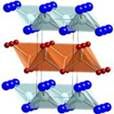New rare-earth superconductors
Advertisement
J. Paul Attfield and colleagues from the University of Edinburgh have shown that using high pressure could double the number of a new group of high temperature superconductors.

J. Paul Attfield / University of Edinburgh
Motivated by the discovery of superconductivity in the first half of the rare earth series (F-doped RFeAsO with R = La-Gd), they decided to investigate whether it was possible to stabilise doped-RFeAsO superconductors from the second half of the series, with R = Tb-Lu.
Using high pressure synthesis, Attfield and colleagues successfully synthesised F-doped TbFeAsO and DyFeAsO superconductors, with critical temperatures of 46 and 45 K respectively.
Attfield believes that this new group of superconductors is the most important discovery in this field since the high-Tc cuprate materials were found 20 years ago. He plans to also stabilise later rare-earth superconductors using the higher pressures. 'The chemical challenges are considerable - preparing phase pure samples of quaternary compounds under high pressure and temperature conditions is time consuming, and the structural and physical characterisation of the small (~20 mg) samples is also demanding. Higher pressures which are likely to be needed for the smallest rare-earths place more stress on the synthesis module, and further reduce the sample size.'
Original publication: J. Paul Attfield et al., Chem. Commun., 2008
Other news from the department science
Most read news
More news from our other portals
See the theme worlds for related content
Topic world Synthesis
Chemical synthesis is at the heart of modern chemistry and enables the targeted production of molecules with specific properties. By combining starting materials in defined reaction conditions, chemists can create a wide range of compounds, from simple molecules to complex active ingredients.

Topic world Synthesis
Chemical synthesis is at the heart of modern chemistry and enables the targeted production of molecules with specific properties. By combining starting materials in defined reaction conditions, chemists can create a wide range of compounds, from simple molecules to complex active ingredients.




























































